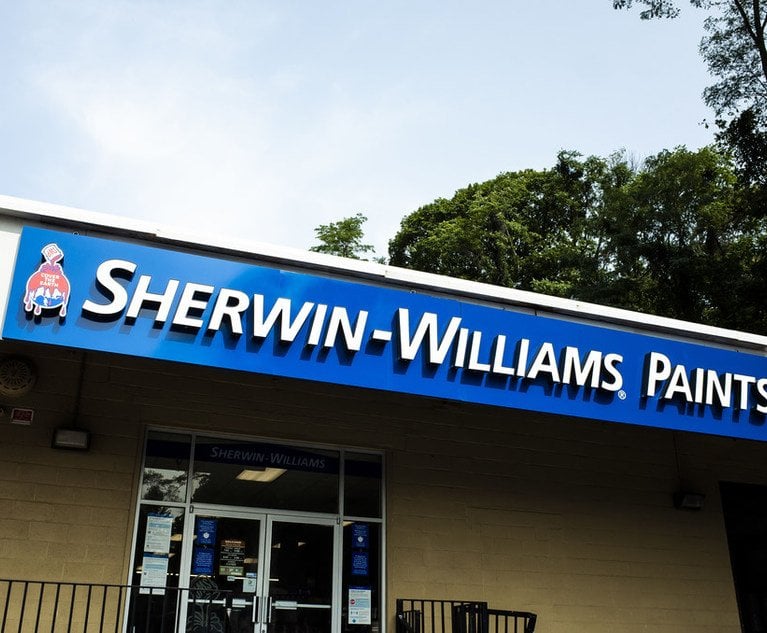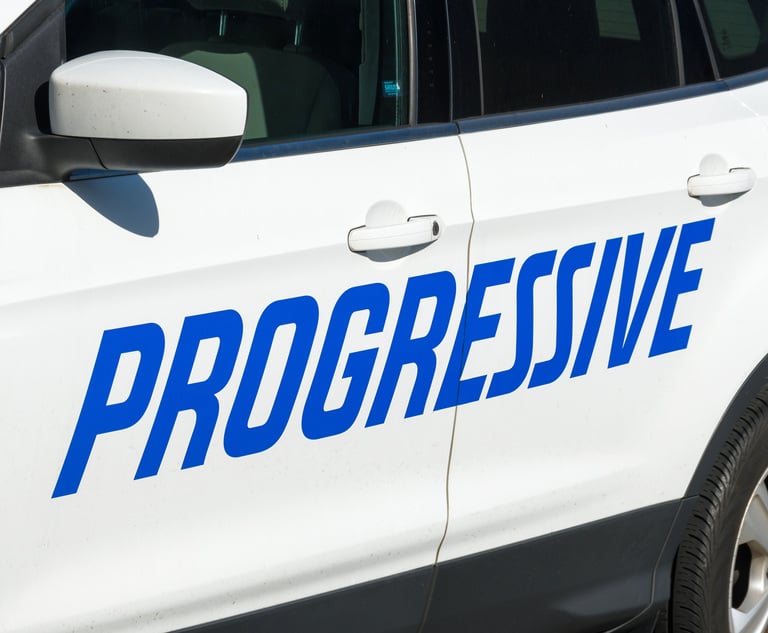What Law Applies Where Insured Resides In Two States And Relies On One State's Insurance Bad Faith Law?
A federal district court in Louisiana has decided that California law – not Louisiana law – governed an uninsured motorist claim brought against an insurance company by a plaintiff who resided in both states.
February 26, 2019 at 12:04 PM
5 minute read

This story is reprinted with permission from FC&S Legal, the industry's only comprehensive digital resource designed for insurance coverage law professionals. Visit the website to subscribe.
A federal district court in Louisiana has decided that California law – not Louisiana law – governed an uninsured motorist claim brought against an insurance company by a plaintiff who resided in both states.
The Case
Von Metriz Lewis, a retired nurse with a residence in Louisiana and a home in California, was driving her 2015 Jeep Wrangler in New Orleans when a sedan violently struck her vehicle, causing it to flip onto the driver's side. Upon impact, the driver of the sedan fled the scene. Ms. Lewis was transported to the emergency room by ambulance, where she was treated for head, neck, and back pain and admitted for overnight observation.
Following the accident, Ms. Lewis submitted a claim to 21st Century Insurance Company for uninsured motorist (“UM”) benefits under her personal automobile policy.
Ms. Lewis presented 21st Century with an offer of settlement and proof of loss.
21st Century responded with a counteroffer, which Ms. Lewis did not accept; she claimed that her medical expenses exceed the value of the counteroffer.
Believing the hit-and-run driver to be at fault, and believing that 21st Century had acted in bad faith in handling her claim, Ms. Lewis sued 21st Century in Louisiana to recover damages resulting from the accident, as well as statutory penalties and attorneys' fees under Louisiana law.
Thereafter, Ms. Lewis presented 21st Century with a second offer of settlement and proof of loss in which she alleged that the value of her damages exceeded the policy limits of $100,000.
21st Century, through counsel, rejected that offer, stating:
[G]iven that this is a California policy, California law will apply. And under these circumstances, a tender is not required and further investigation is necessary. Once additional discovery is completed, 21st Century Insurance Company will reevaluate their position regarding your client's claims.
Thereafter, 21st Century moved for partial summary judgment, requesting a determination that California law applied to Ms. Lewis' UM claim, and that her claims for statutory penalties and attorneys' fees under Louisiana law had to be dismissed with prejudice.
The district court denied 21st Century's motion for partial summary judgment. It reasoned that because Ms. Lewis had received no payment from 21st Century – her UM carrier – or the unidentified hit-and-run driver, and because the application of California law could foreclose her ability to recover under her policy, Louisiana's interest in promoting full recovery for innocent tort victims would be most seriously impaired if Louisiana law were not applied.
The insurer moved the court to reconsider. It argued that a plaintiff's dual residency and potential inability to recover under her policy should the issuing state's law be applied had never been used by a Louisiana state or federal court applying Louisiana law as a primary reason to abrogate another state's insuring agreement.
The District Court's Decision
The district court granted the motion to reconsider, and then decided that California law governed.
In its decision, the district court said that 21st Century had persuaded it that California's policies would be “most seriously impaired if its law were not applied,” while Ms. Lewis had offered “no colorable argument in opposition.”
The district court explained that, in its prior decision, it “arguably placed undue emphasis upon the plaintiff's ability to recover.” The district court said that although applying California law could preclude a Louisiana resident from recovering damages to which she might be entitled, applying Louisiana law “would unquestionably abrogate a California contract by exposing the insurance carrier to bad faith statutory penalties for which it may not have foreseen or negotiated.”
The district court added that, further tipping the scale slightly in favor of California, was the fact that Ms. Lewis' premium for UM coverage was based on the application of California law to the contract because the policy issued to Ms. Lewis was issued as a California personal auto policy and the premiums charged reflected that the policy was to cover vehicles garaged in View Park, California.
Moreover, the district court continued, because Ms. Lewis testified under oath that she never disclosed to 21st Century that she had moved to Louisiana, the insurer did not reasonably expect to be subject to Louisiana UM law.
Accordingly, the district court granted the insurer's motion for reconsideration and it granted 21st Century's motion for partial summary judgment that California law governed Ms. Lewis' UM claim, such that her claims for statutory penalties and attorneys' fees under Louisiana law had to be dismissed with prejudice.
The case is Lewis v. 21st Century Ins. Co., No. 18-5013 (E.D. La. Feb. 25, 2019).
Steven A. Meyerowitz, Esq., is the Director of FC&S Legal, the Editor-in-Chief of the Insurance Coverage Law Report, and the Founder and President of Meyerowitz Communications Inc. As FC&S Legal Director, Mr. Meyerowitz, a member of the team that conceptualized FC&S Legal, provides daily analysis and commentary on the most significant insurance coverage law decisions from courts across the country and news regarding legislative and regulatory developments. A graduate of Harvard Law School, Mr. Meyerowitz was an attorney at a prominent Wall Street law firm before founding Meyerowitz Communications Inc., a law firm marketing communications consulting company.
This content has been archived. It is available through our partners, LexisNexis® and Bloomberg Law.
To view this content, please continue to their sites.
Not a Lexis Subscriber?
Subscribe Now
Not a Bloomberg Law Subscriber?
Subscribe Now
NOT FOR REPRINT
© 2025 ALM Global, LLC, All Rights Reserved. Request academic re-use from www.copyright.com. All other uses, submit a request to [email protected]. For more information visit Asset & Logo Licensing.
You Might Like
View All
Texas Insurer Slaps Hinshaw & Culbertson With Legal Mal Claim Over $11 Million Personal Injury Jury Award
3 minute read
Insurers Dodge Sherwin-Williams' Claim for $102M Lead Paint Abatement Payment, State High Court Rules


'A Wake Up Call to the Life Insurance Industry:' California Sues Insurers
3 minute readTrending Stories
- 1Restoring Trust in the Courts Starts in New York
- 2'Pull Back the Curtain': Ex-NFL Players Seek Discovery in Lawsuit Over League's Disability Plan
- 3Tensions Run High at Final Hearing Before Manhattan Congestion Pricing Takes Effect
- 4Improper Removal to Fed. Court Leads to $100K Bill for Blue Cross Blue Shield
- 5Michael Halpern, Beloved Key West Attorney, Dies at 72
Who Got The Work
Michael G. Bongiorno, Andrew Scott Dulberg and Elizabeth E. Driscoll from Wilmer Cutler Pickering Hale and Dorr have stepped in to represent Symbotic Inc., an A.I.-enabled technology platform that focuses on increasing supply chain efficiency, and other defendants in a pending shareholder derivative lawsuit. The case, filed Oct. 2 in Massachusetts District Court by the Brown Law Firm on behalf of Stephen Austen, accuses certain officers and directors of misleading investors in regard to Symbotic's potential for margin growth by failing to disclose that the company was not equipped to timely deploy its systems or manage expenses through project delays. The case, assigned to U.S. District Judge Nathaniel M. Gorton, is 1:24-cv-12522, Austen v. Cohen et al.
Who Got The Work
Edmund Polubinski and Marie Killmond of Davis Polk & Wardwell have entered appearances for data platform software development company MongoDB and other defendants in a pending shareholder derivative lawsuit. The action, filed Oct. 7 in New York Southern District Court by the Brown Law Firm, accuses the company's directors and/or officers of falsely expressing confidence in the company’s restructuring of its sales incentive plan and downplaying the severity of decreases in its upfront commitments. The case is 1:24-cv-07594, Roy v. Ittycheria et al.
Who Got The Work
Amy O. Bruchs and Kurt F. Ellison of Michael Best & Friedrich have entered appearances for Epic Systems Corp. in a pending employment discrimination lawsuit. The suit was filed Sept. 7 in Wisconsin Western District Court by Levine Eisberner LLC and Siri & Glimstad on behalf of a project manager who claims that he was wrongfully terminated after applying for a religious exemption to the defendant's COVID-19 vaccine mandate. The case, assigned to U.S. Magistrate Judge Anita Marie Boor, is 3:24-cv-00630, Secker, Nathan v. Epic Systems Corporation.
Who Got The Work
David X. Sullivan, Thomas J. Finn and Gregory A. Hall from McCarter & English have entered appearances for Sunrun Installation Services in a pending civil rights lawsuit. The complaint was filed Sept. 4 in Connecticut District Court by attorney Robert M. Berke on behalf of former employee George Edward Steins, who was arrested and charged with employing an unregistered home improvement salesperson. The complaint alleges that had Sunrun informed the Connecticut Department of Consumer Protection that the plaintiff's employment had ended in 2017 and that he no longer held Sunrun's home improvement contractor license, he would not have been hit with charges, which were dismissed in May 2024. The case, assigned to U.S. District Judge Jeffrey A. Meyer, is 3:24-cv-01423, Steins v. Sunrun, Inc. et al.
Who Got The Work
Greenberg Traurig shareholder Joshua L. Raskin has entered an appearance for boohoo.com UK Ltd. in a pending patent infringement lawsuit. The suit, filed Sept. 3 in Texas Eastern District Court by Rozier Hardt McDonough on behalf of Alto Dynamics, asserts five patents related to an online shopping platform. The case, assigned to U.S. District Judge Rodney Gilstrap, is 2:24-cv-00719, Alto Dynamics, LLC v. boohoo.com UK Limited.
Featured Firms
Law Offices of Gary Martin Hays & Associates, P.C.
(470) 294-1674
Law Offices of Mark E. Salomone
(857) 444-6468
Smith & Hassler
(713) 739-1250






